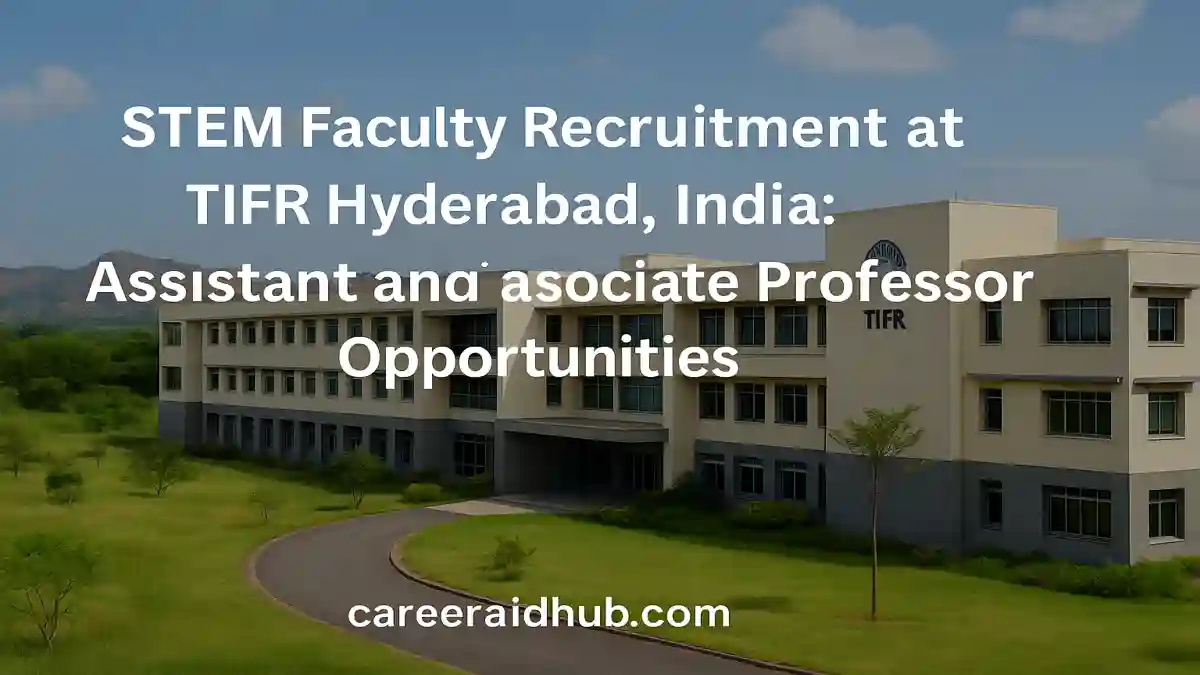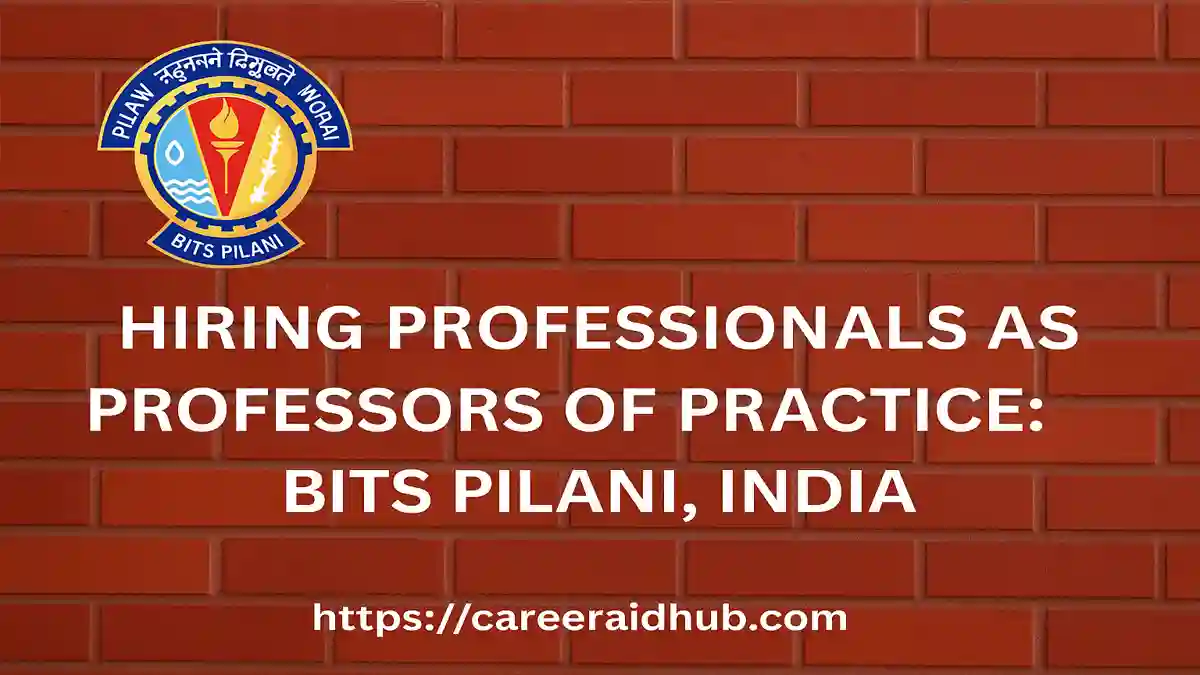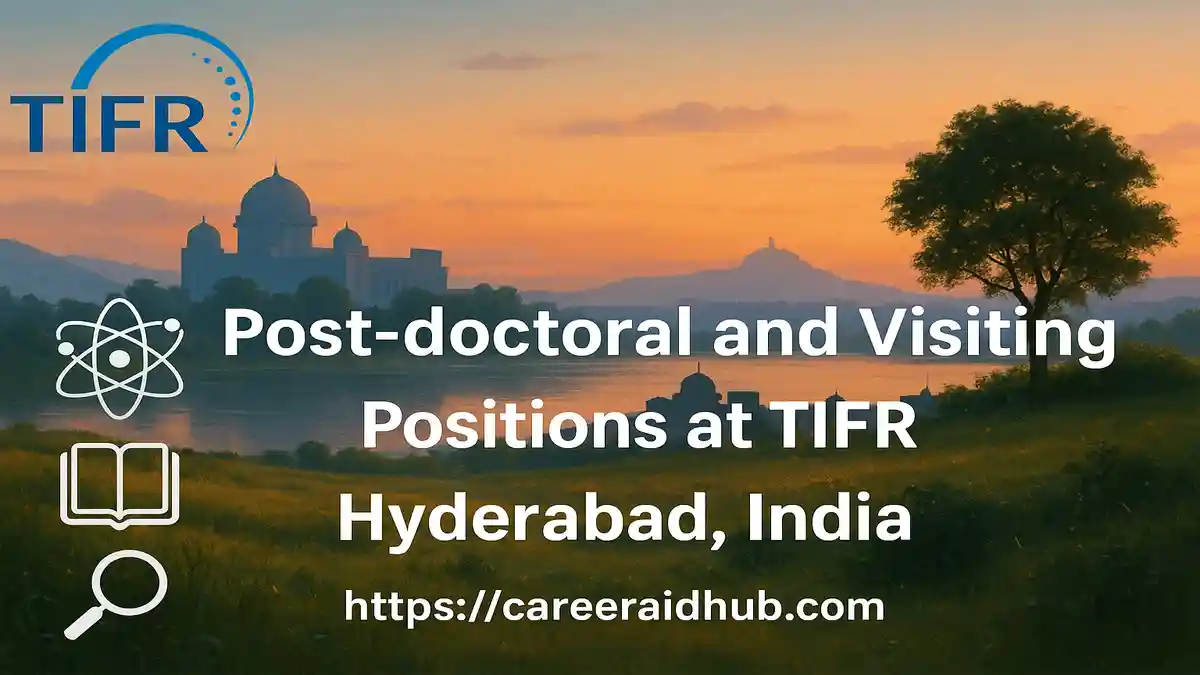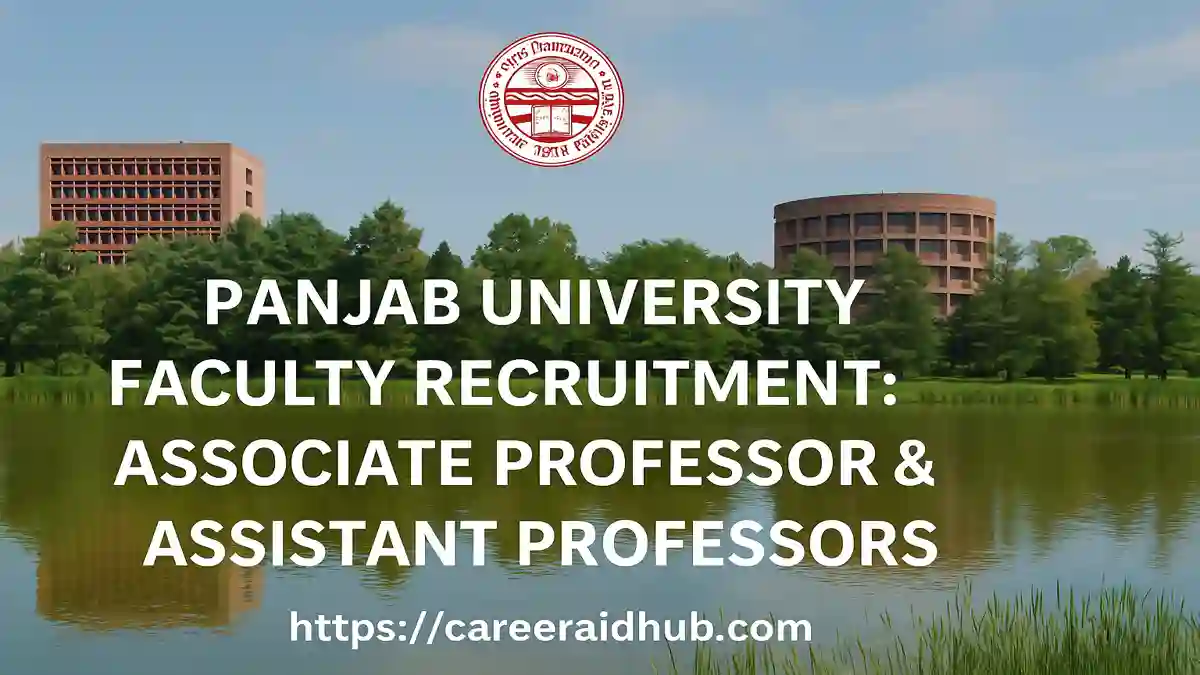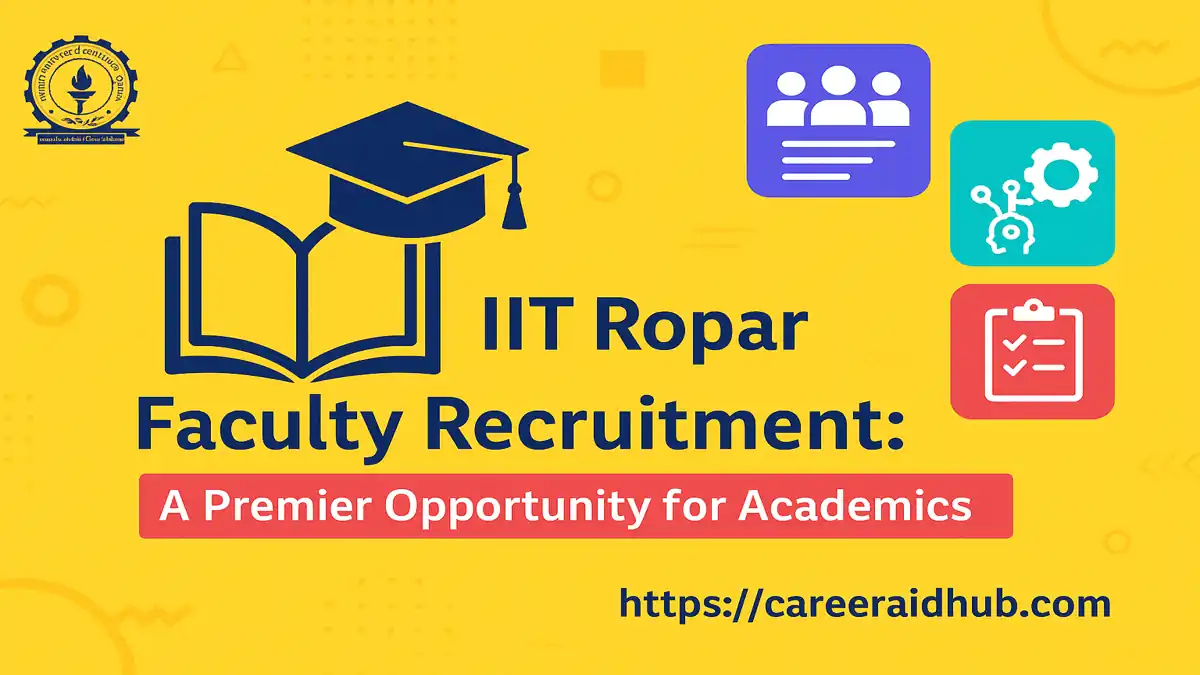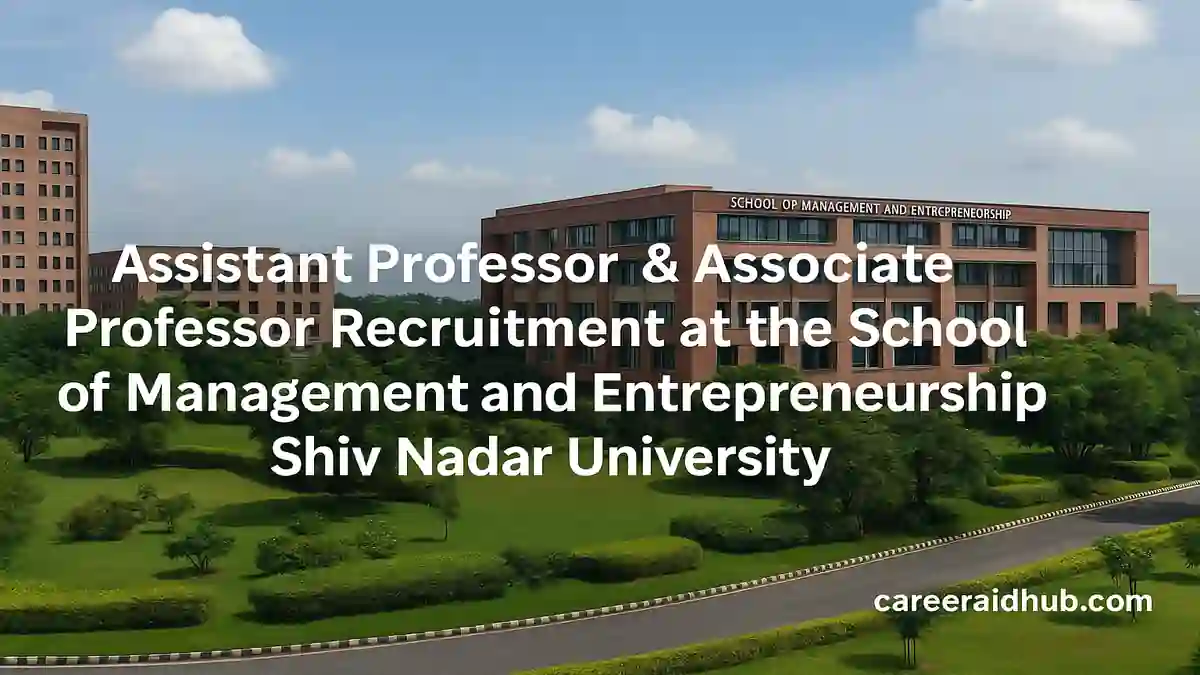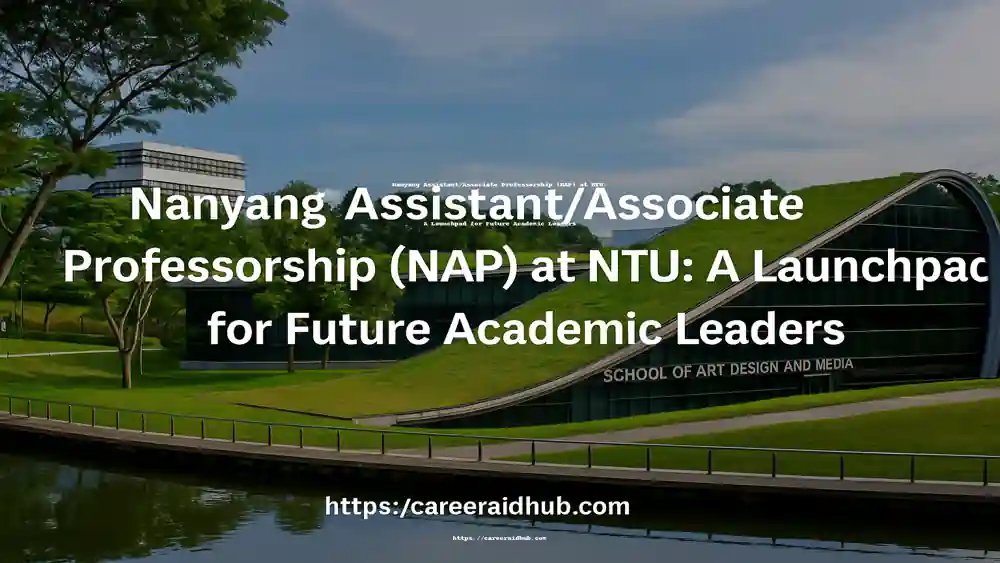Tata Institute of Fundamental Research Hyderabad (TIFR Hyderabad or TIFR-H) is emerging as a dynamic hub for cutting-edge research across the physical and life sciences. For early- and mid-career physicists seeking physics faculty recruitment in India and aiming to build ambitious, independent research programmes, TIFR Hyderabad offers a rare combination of academic freedom, strong institutional support, and a deeply interdisciplinary campus that connects Physics with Chemistry, Biology, Mathematics, Computer Science, Engineering, and Materials Science.
TIFR Hyderabad offers exceptional physics faculty recruitment opportunities for early- and mid-career researchers who wish to build independent research groups, lead frontier projects, and mentor talented students in India. The campus provides an interdisciplinary environment connecting physics with chemistry, biology, engineering, and computation, supported by strong institutional backing and global research collaborations.
TIFR Hyderabad is currently inviting applications for Assistant Professor and Associate Professor positions in Physics from outstanding researchers working in clearly defined frontier research areas. The call remains open throughout the year, and appointments are made based on the overall strength of the candidate’s research vision, publication track record, mentoring potential, and alignment with the institute’s long-term scientific priorities in physics and allied fields.
Why TIFR Hyderabad for a Physics Faculty Career?
TIFR institutes are internationally recognised for their strong emphasis on fundamental research, culture of academic freedom, and access to world-class experimental and computational facilities. TIFR Hyderabad has been conceived as a comprehensive science campus that brings together Physics, Chemistry, Biology, Mathematics, Computer Science, Engineering, and Materials Science under one umbrella. This integrated structure allows faculty members to look beyond traditional departmental boundaries and pursue research problems that naturally span multiple disciplines.
Interdisciplinary Research Culture at TIFR Hyderabad
For a faculty member in Physics, this environment offers several tangible advantages:
-
- Access to diverse collaborators: You will interact daily with colleagues working in cutting-edge areas across the natural sciences. This proximity makes it easier to initiate joint projects that combine modelling, experiments, and computation, and to develop cross-disciplinary proposals for external funding.
- Support for curiosity-driven work: TIFR’s mandate emphasises long-term, fundamental questions. Consequently, you are encouraged to formulate deep, non-trivial research problems without constant pressure to follow short-lived trends or purely application-driven agendas.
- High-calibre graduate students: The TIFR (Deemed University) graduate programme selects students through a rigorous, national-level process. Many entrants arrive with strong training in physics and mathematics and are ready to engage with demanding theoretical or experimental projects from an early stage.
- Competitive start-up and intramural funding: New faculty members can access internationally competitive start-up packages and sustained intramural support. This funding allows
you to establish laboratories or theoretical groups with the necessary instrumentation, software, and computational resources required for high-impact physics research.
A Natural Home for Multidisciplinary Physics Research
The institute explicitly values multidisciplinarity. Therefore, whether you work in a core subfield of physics or at interfaces such as physics–chemistry, physics–biology, or physics–computation, your research can find a natural institutional home here. Many of the focus areas listed in this faculty call—such as soft and active matter or physics of life—are intrinsically cross-disciplinary and encourage collaborations with chemists, biologists, and engineers on campus.
For readers who want to situate TIFR Hyderabad within the broader Indian research landscape before committing to a physics faculty career in India, it is useful to examine the national role of TIFR described on the main TIFR website and related government pages, such as the Department of Atomic Energy. These resources provide additional context on how TIFR fits into India’s long-term science and technology vision.
Physics-Oriented Research Areas in Focus
The current call is targeted at several frontline domains of modern physics, covering both theoretical and experimental research. These areas are not exhaustive, but they clearly indicate the kinds of directions TIFR Hyderabad is particularly keen to strengthen through new assistant and associate professor recruitment in physics.
justify;">
Condensed-Matter Physics
TIFR Hyderabad seeks to reinforce its efforts in condensed-matter physics, especially in systems that are far from equilibrium or display complex emergent behaviour. Illustrative topics include:
-
- Classical and quantum non-equilibrium systems, such as driven, disordered, or open systems where relaxation, transport, and fluctuations play a central role.
- Ultra-cold atomic systems that function as highly controllable quantum simulators for many-body phenomena, allowing precise tests of theoretical ideas.
- Computational techniques for correlated systems, including numerical, high-performance computing, and data-driven approaches to strongly interacting electrons, spins, or bosons.
- Soft and active matter, ranging from colloidal assemblies and gels to biological or bio-inspired materials that exhibit collective motion, pattern formation, and complex rheology.
If your research explores emergent behaviour, phase transitions, glassy dynamics, or complex statistical mechanics, this condensed-matter cluster is very well aligned with your expertise and will fit naturally within the TIFR Hyderabad physics faculty programme.
-
Quantum Matter and Quantum Technologies
With quantum technologies moving from conceptual development to early deployment, TIFR Hyderabad aims to build a vibrant programme in quantum matter and quantum technologies. Areas of interest include:
-
- Quantum circuits, including superconducting, solid-state, or hybrid platforms designed for quantum information processing and quantum simulation.
- Quantum devices and sensors, such as highly
sensitive detectors for magnetic fields, forces, or electromagnetic radiation at the quantum limit.
- Quantum metrology, which leverages entanglement, squeezing, or other non-classical resources to exceed classical precision limits.
- Quantum materials, including systems with non-trivial topology, strong electron correlations, or exotic quasiparticles that can underpin next-generation quantum devices.
Researchers developing next-generation quantum hardware, quantum measurement protocols, or novel quantum materials will find both scientific peers and opportunities to collaborate with experimental and theoretical groups across the campus through these quantum physics faculty positions.
-
Optics and Spectroscopy
The call also emphasises optics, light–matter interaction, and advanced spectroscopic techniques. TIFR Hyderabad welcomes candidates working on:
-
- Fundamental and applied light–matter interaction, from strong-coupling regimes to structured and confined light in complex media.
- Circuit quantum electrodynamics (cQED), where microwave photons interact coherently with artificial atoms or solid-state qubits in superconducting circuits.
- Intense laser physics, including ultrafast processes, high-field phenomena, and surface or interface dynamics probed using advanced laser systems.
- Quantum optics for information, communication, and metrology, encompassing single-photon sources, entanglement distribution, and precision measurement protocols.
This portfolio is ideal for scientists using high-field lasers, nanoscale photonic structures, sophisticated spectroscopic setups, or integrated photonics platforms to interrogate and control matter, and who are seeking faculty jobs in optics and spectroscopy at a research-focused institute.
-
Dynamical and Non-Linear Systems
Another important focus is on dynamical and non-linear systems, where complex temporal and spatial behaviour emerges from relatively simple governing laws. Illustrative themes include:
-
- Turbulent flows, both classical and quantum, in which multiscale energy cascades, intermittency, and coherent structures pose fundamental challenges.
- Relativistic flows and plasma dynamics, relevant to astrophysical systems, fusion plasmas, and high-intensity laser–plasma interactions.
- Fluid dynamics of biological or soft systems, including microswimmers, biofluids, emulsions, and soft interfaces with non-trivial mechanical responses.
- Quantum chaos and non-linear quantum dynamics, where ideas from classical chaos intersect with quantum interference, decoherence, and many-body effects.
If you work at the interface of fluid mechanics, plasma physics, or non-linear dynamics—with strong theoretical, computational, or experimental components—this opportunity allows you to build a group in an area with rich connections across the institute’s broader research landscape.
-
Physics of Life
A distinctive emphasis at TIFR Hyderabad is on the Physics of Life, where physical principles are applied to understand living systems across multiple scales. Areas of interest include:
-
- Statistical and physical perspectives on evolution, focusing on population dynamics, fitness landscapes, and evolutionary trajectories in fluctuating environments.
- Information processing, feedback, and control in biological networks, from gene regulatory circuits to neural, metabolic, and signalling networks.
- Physics of cancer, growth, and disease progression, where mechanical, chemical, and statistical factors interact in complex ways over time.
- Pattern formation, morphogenesis, and organogenesis, which connect developmental biology with non-linear dynamics, soft matter, and statistical physics.
This cluster is a natural fit for physicists working in quantitative biology, biophysics, systems biology, or multiscale modelling of biological processes, particularly those comfortable collaborating with experimental biologists, clinicians, and computational scientists while holding faculty positions in biophysics or physics of life.
Who Should Apply? – Profile of Ideal Candidates
TIFR Hyderabad is looking for outstanding researchers with a strong record of original contributions in one or more of the listed areas. While the exact criteria are assessed holistically during the physics faculty recruitment process, typical expectations include:
-
- A Ph.D. in Physics or a closely related discipline in one of the relevant research directions.
- A proven academic track record, visible through high-quality publications, impactful scientific results, invited talks, and recognition within the physics community.
- At least two years of postdoctoral experience, usually at leading institutions; in truly exceptional cases, this requirement may be relaxed.
- A clear and compelling research statement, articulating both near-term projects and a long-term vision, including how your work will connect with and expand existing strengths at TIFR Hyderabad.
- A strong commitment to graduate teaching and mentoring, since faculty members are expected to contribute actively to the TIFR graduate programme alongside their research.
Assistant Professor Level
At the Assistant Professor level, the institute is particularly keen to recruit dynamic early-career scientists who:
-
- Demonstrate clear potential to build an independent research group within a few years of joining.
- Can articulate how their work will open new directions or deepen existing programmes on campus in line with TIFR Hyderabad’s strategic vision for physics.
- Are enthusiastic about supervising Ph.D. students and postdocs and about contributing to the broader intellectual and academic life of the institute.
Associate Professor Level
At the Associate Professor level, applicants are expected to have:
-
- A well-established body of work, including a coherent research programme and sustained, peer-recognised contributions in their area.
- Evidence of scientific leadership, such as leading collaborations, organising workshops or conferences, and helping to shape emerging subfields.
- A strong record of mentoring students or postdoctoral researchers, ideally with former mentees who have progressed to competitive positions in academia or industry.
What TIFR Hyderabad Offers to New Faculty
TIFR Hyderabad emphasises creating an environment where ambitious, long-term scientific questions can be pursued seriously and sustainably. For researchers considering a long-term faculty career in physics in India, the institute offers both intellectual freedom and structured support.
Research Environment and Infrastructure
Key features of the faculty experience include:
-
- Internationally competitive start-up funding to set up experimental laboratories or computational infrastructure tailored to your research needs.
- Substantial intramural research funding, alongside access to central facilities, shared instrumentation, and experienced technical support staff.
- A collaborative campus with faculty across Physics, Chemistry, Biology, Mathematics, Computer Science, and related areas, enabling multi-pronged approaches to complex scientific problems.
Academic Life and Campus Culture
Beyond direct research funding, TIFR Hyderabad also offers:
-
- A commitment to building a diverse and inclusive workplace, with active efforts to move towards a gender-balanced faculty and student body in the long term.
- A lively calendar of seminars, colloquia, conferences, and outreach events, providing regular exposure to visitors from leading institutions worldwide and offering faculty members ample opportunities to present and discuss their work.
- Opportunities to participate in graduate curriculum design, advanced courses, and thematic schools, allowing faculty to shape how the next generation of scientists is trained and mentored.
Together, these features make TIFR Hyderabad particularly attractive for researchers who value both intellectual independence and robust institutional support throughout their careers in physics.
Application Process and Timeline
Applications for Physics faculty positions at TIFR Hyderabad are accepted throughout the year and are generally reviewed on a rolling basis. This flexible approach allows candidates to apply when their profiles, publications, and research plans are in a strong, consolidated state.
Step-by-Step Application Process
Prospective candidates are typically expected to:
-
- Apply online through the dedicated faculty recruitment portal linked from the official TIFR Hyderabad careers page. This portal hosts the latest information on physics faculty vacancies and application forms.
- Register on the portal and upload the required documents, which usually include a detailed CV, a complete list of publications, a research statement, a teaching statement, and contact details for referees who can comment on your work in depth.
- Direct specific queries to the email addresses mentioned on the official page for faculty recruitment and faculty affairs coordination, especially if you need clarification regarding fit, required documentation, or expected timelines.
The final level of appointment (Assistant or Associate Professor) is decided after internal evaluation, based on your overall profile, scientific achievements, and future potential within the institute’s strategic priorities in physics.
Evaluation Windows and Future Cycles
The call is open year-round. However, evaluations usually occur in defined review windows. During these periods, shortlisted candidates may be invited for research seminars, faculty interactions, and formal interviews.
Based on recent TIFR-wide patterns, major evaluation activity often appears in the middle and end of the calendar year. Therefore, you may treat June 2026 and November 2026 as tentative review windows. Even so, these dates are only approximate and will be updated once new official notices are released.
For applicants planning long-term academic careers, regular preparation is essential. Thus, it helps to refresh your application materials at least once a year. In addition, you should check the official page frequently for updated advertisement numbers, revised criteria, or any process changes related to physics faculty recruitment.
Is This the Right Move for You?
You should consider applying to TIFR Hyderabad if you:
-
- Aim to build a world-class physics research programme in India while staying globally connected.
- Prefer an environment where curiosity-driven, fundamental research is encouraged and well supported.
- Enjoy crossing disciplinary boundaries and collaborating across physics, chemistry, biology, mathematics, computer science, and engineering.
- Want strong start-up support, excellent students, and high-quality facilities that enable ambitious, long-term projects.
Expert Tips to Strengthen Your Application
To improve your chances in this competitive process:
-
- Present a clear and coherent research vision. Explain what you plan to do, why it matters, and how it aligns with existing strengths at TIFR Hyderabad.
- Highlight your independent contributions, especially work where you are lead or corresponding author, and clarify your role in collaborative projects.
&amp;lt;li>Emphasise cross-disciplinary links, particularly if your work spans multiple clusters such as soft matter, physics of life, quantum materials, or quantum technologies.</ul>
<li>Provide evidence of teaching or mentoring, even in early career stages—such as supervising projects, co-supervising theses, mentoring juniors, or designing advanced courses.
</li>
Conclusion
yle=”text-align: justify;”>If this aligns with your goals, your next step is simple. Review the official Faculty Positions – Physics page, match your materials with the stated expectations, and apply through the online portal. With careful planning and a strong research vision, your next major career move in academic physics may begin at TIFR Hyderabad.
</tr>
|
Feature
|
Details
|
|
Program Name
|
Faculty Positions in Physics – Assistant and Associate Professor, TIFR Hyderabad
|
|
Institution
|
Tata Institute of Fundamental Research Hyderabad (TIFR-H)
|
|
Location
|
Hyderabad, Telangana, India
|
|
Positions
|
Assistant Professor, Associate Professor
|
|
Fields of Study
|
Condensed-matter physics, quantum matter and technologies, optics and spectroscopy, dynamical systems, physics of life
|
|
Eligibility
|
Ph.D. in Physics or related field, strong research record, usually ≥2 years postdoctoral experience
|
|
Application Mode
|
Online application via TIFR Hyderabad careers portal
|
|
Application Timeline
|
Rolling; major evaluation windows typically around June and November (will be updated soon)
|
|
Support and Benefits
|
Salary as per TIFR/DAE norms, start-up funding, intramural support, shared facilities
|
|
Official Website
|
Click here
|
References
[1] Faculty Positions – Tata Institute of Fundamental Research Hyderabad.
[2] Research Areas – Tata Institute of Fundamental Research Hyderabad.
Frequently Asked Questions (FAQs)
What are the main physics faculty positions available at TIFR Hyderabad? TIFR Hyderabad recruits outstanding researchers for Assistant Professor and Associate Professor positions in physics, covering condensed matter, quantum technologies, optics, dynamical systems, and physics of life.
How do I apply for a physics faculty position at TIFR Hyderabad? You apply online through the official TIFR Hyderabad careers portal, then upload your CV, publications list, statements, and referee details as per the advertised guidelines.
What qualifications do I need for an Assistant Professor position in physics at TIFR Hyderabad? You generally need a Ph.D. in physics or a related field, a strong research record, and at least two years of high-quality postdoctoral experience.
What research areas in physics does TIFR Hyderabad currently prioritise for faculty recruitment? TIFR Hyderabad prioritises condensed-matter physics, quantum matter and technologies, optics and spectroscopy, dynamical and non-linear systems, and physics of life for new physics faculty hires.
Does TIFR Hyderabad offer start-up funding for new physics faculty members? Yes, new physics faculty typically receive internationally competitive start-up funding, along with intramural support and access to shared research facilities and technical staff.
How important is interdisciplinary research for physics faculty at TIFR Hyderabad? Interdisciplinary research is highly valued, since the campus integrates physics with chemistry, biology, mathematics, computer science, engineering, and materials science.
What should I highlight in my research statement for a TIFR Hyderabad physics faculty application? You should emphasise originality, long-term vision, feasibility, alignment with campus strengths, and clear plans for supervising students and building an independent research group.

